De Amerikaanse schrijver Richard Yates werd geboren op 3 februari 1926 in Yonkers, New York. Zie ook alle tags voor Richard Yates op dit blog.
Uit: Revolutionary Road
“See you tomorrow!” they called, as happy as children, and riding home under the moon they found they could roll down the windows of their cars and let the air in, with its health-giving smells of loam and young flowers. It was the first time many of the Laurel Players had allowed themselves to acknowledge the coming of spring.
The year was 1955 and the place was a part of western Connecticut where three swollen villages had lately been merged by a wide and clamorous highway called Route Twelve. The Laurel Players were an amateur company, but a costly and very serious one, carefully recruited from among the younger adults of all three towns, and this was to be their maiden production. All winter, gathering in one anther’s living rooms for excited talks about Ibsen and Shaw and O’Neill, and then for the show of hands in which a common-sense majority chose The Petrified Forest, and then for preliminary casting, they had felt their dedication growing stronger every week.
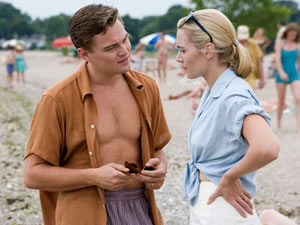
Scene uit de film met Kate Winslet en Leonardo DiCaprio
They might privately consider their director a funny little man (and he was, in a way: he seemed incapable of any but a very earnest manner of speaking, and would often conclude his remarks with a little shake of the head that caused his cheeks to wobble) but they liked and respected him, and they fully believed in most of the things he said. “Any play deserves the best that any actor has to give,” he’d told them once, and another time: “Remember this. We’re not just putting on a play here. We’re establishing a community theater, and that’s a pretty important thing to be doing.”
The trouble was that from the very beginning they had been afraid they would end by making fools of themselves, and they had compounded that fear by being afraid to admit it. At first their rehearsals had been held on Saturdays–always, it seemed, on the kind of windless February or March afternoon when the sky is white, the trees are black, and the brown fields and hummocks of the earth lie naked and tender between curds of shriveled snow.“
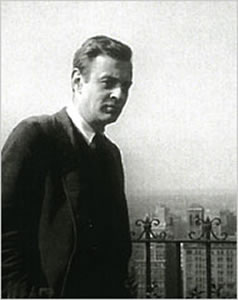
Richard Yates (3 februari 1926 – 7 november 1992)
De Britse toneelschrijftster Sarah Kane werd geboren op 3 februari 1971 in Essex. Zie ook alle tags voor Sarah Kane op dit blog.
Uit: 4.48 Psychosis
„I will drown in dysphoria
in the cold black pond of my self
the pit of my immaterial mind
How can I return to form
now my formal thought has gone?
Not a life that I could countenance.
They will love me for that which destroys me
the sword in my dreams
the dust of my thoughts
the sickness that breeds in the folds of my mind
Every compliment takes a piece of my soul
* * * * * * * * *
I dread the loss of her I’ve never touched
love keeps me a slave in a cage of tears
I gnaw my tongue with which to her I can never speak
I miss a woman who was never born
I kiss a woman across the years that say we shall never meet
Everything passes
Everything perishes
Everything palls
my thought walks away with a killing smile
leaving discordant anxiety
which roars my soul
No hope No hope No hope No hope No hope No hope No hope“
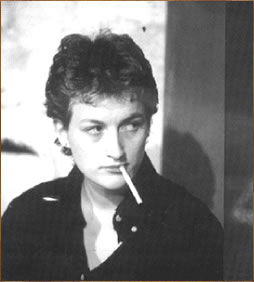
Sarah Kane (3 februari 1971 – 20 februari 1999)
De Amerikaanse schrijver James A. Michener werd geboren op 3 februari 1907 in New York. Zie ook alle tags voor James A. Michener op dit blog.
Uit: Hawaii
„Millions upon millions of years ago, when the continents were already formed and the principal features of the earth had been decided, there existed, then as now, one aspect of the world that dwarfed all others. It was a mighty ocean, resting uneasily to the east of the largest continent, a restless ever-changing, gigantic body of water that would later be described as pacific.
Over its brooding surface immense winds swept back and forth, whipping the waters into towering waves that crashed down upon the world’s seacoasts, tearing away rocks and eroding the land. In its dark bosom, strange life was beginning to form, minute at first, then gradually of a structure now lost even to memory. Upon its farthest reaches birds with enormous wings came to rest, and then flew on.
Agitated by a moon stronger then than now, immense tides ripped across this tremendous ocean, keeping it in a state of torment. Since no great amounts of sand had yet been built, the waters where they reached shore were universally dark, black as nigh and fearful.
Scores of millions of years before man had risen from the shores of the ocean to perceive its grandeur and to venture forth upon its turbulent waves, this eternal sea existed, larger than any other of the earth’s features, vaster than the sister oceans combined, wild, terrifying in its immensity and imperative in its universal role.
How utterly vast it was! How its surges modified the very balance of the earth! How completely lonely it was, hidden in the dark ness of night or burning in the dazzling power of a younger sun than ours.“
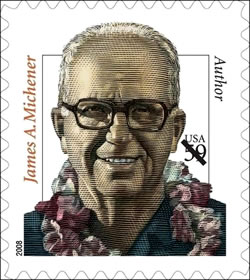
James A. Michener (3 februari 1907 – 16 oktober 1997)
De Duitse schrijfster Annette Kolb werd geboren op 3 februari 1870 in München. Zie ook alle tags voor Annette Kolb op dit blog.
Uit: Wege und Umwege
“Marie stand mit fûnf Jahren eines Morgens unter einem Baum, dessen Laub im Winde rauschte und den blauen Himmel durchblicken liess. „Das Leben ist schön!” dachte sie.
Da flog ein Blatt von den Zweigen herab in ihre Hand, und wahrend sie seine groben Adern
und Fasern langsam auseinanderrifi, wurde sie unsaglich verstimmt. Nicht der frohbewegte Wipfel in der Hohe, das einzelne langweilige Ding in ihren Hânden war die Wirklichkeitl —
Der Grundakkord ihres Wesens schlug da zum erstenmal an ihr Bewusstsein an; denn es gibt nichts Neues im Menschen. Das fin mot eines Ich’s ist ein Motiv, und was hinzutritt, sind Amplifikationen.
Schon ein Jahr darauf lernte sie im Kloster die Langeweile kennen, zu der sie neigte wie
ein anderer zu Gichtschmerzen oder Rheumatismen, und die sie anwehen konnte, plötzlich, unvermittelt wie ein Wind, der um die Ecke fahrt.
In ihrem Kloster blies sie durch das ganze Haus, um allé Mauern, und durch den ganzen
Garten, die Stelle ausgenommen, an der eine reizende Brücke iiber den Wildbach bog, Libellen unklosterlich schwirrten und die Baume parkähnlich zusammenstanden. Aber allés andere war hässlich. Zwei hohe plumpe Berge versperrten wie Riesentore nach Norden hin die Welt, und die Monatsrosen standen, meist verwelkt und verweht, um ein machtiges Kreuz vor dem Haus.”
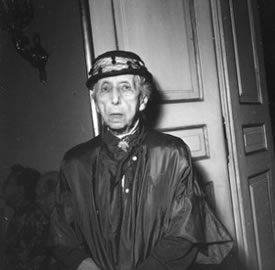
Annette Kolb (3 februari 1870 – 3 december 1967)
Kolb in 1958
De Duitse dichter en schrijver Ernst von Wildenbruch werd op 3 februari 1845 geboren in Beiroet. Zie ook alle tags voor Ernst von Wildenbruch op dit blog.
Uit: Schwester-Seele
„War das heute wieder einmal reizend bei Benneckes! Hübsch war es ja immer bei ihnen; natürlich. In einem Hause, wo eine Wirtin war wie Frau Majorin Bennecke! Die Tante Löckchen, wie sie in der ganzen Stadt hieß, die gute Tante Löckchen.
Wenn man sie so sah, mit dem runden, freundlichen Gesicht, wie sie durch die Straßen der Stadt zog und über die große Brücke, die zu ihrem Hause jenseit des Flusses führte – den Kopf in beständig nickender Bewegung: »Guten Tag, Kindchen – liebes Kindchen, guten Tag« – und die altmodischen grauen Löckchen, die zu beiden Seiten des Gesichts wie Traubenbüschel niederhingen, nach vorn fliegend und wieder zurück – wahrhaftig, man blieb geradezu stehen und horchte, ob nicht die Löckchen, aneinanderschlagend, einen leise klingenden Ton geben würden, so ein ganz zartes Geläute, wie man es aus Rokokouhren vernimmt, die auf Rokokokaminen stehen, leise und fein wie die Stimme der alten Zeit, als die Damen noch ausgeschnittene Schuhe mit kreuzweise gelegten Bändern trugen, sich nachmittags beim Kaffee Gedichte vorlasen, und als es noch keine pfeifenden Lokomotiven gab.
Manchmal ging sie allein, manchmal auch am Arme ihres Gatten, des alten Herrn Majors a. D. Bennecke, und dann schritt hinter ihnen noch ein drittes, die braune Hühnerhündin Diana, die uralte, mit dem langen seidenweichen Fell und dem sanftmütigen Augenaufschlag.“
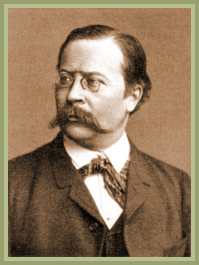
Ernst von Wildenbruch (3 februari 1845 – 15 januari 1909)
